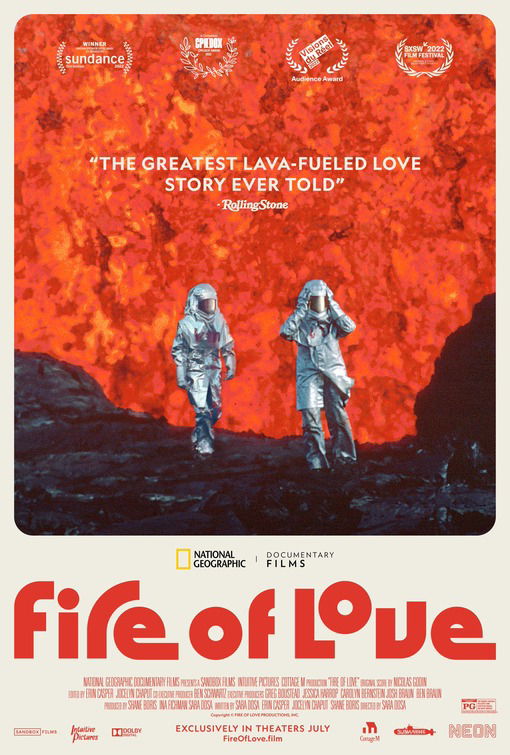"Love, Sacrifice, Devotion, and Service"

| None | Light | Moderate | Heavy | |
|---|---|---|---|---|
| Language | ||||
| Violence | ||||
| Sex | ||||
| Nudity |
What You Need To Know:
FIRE OF LOVE treats viewers to the tragedy of Maurice, Katia and their all-encompassing idol, volcanoes. The footage of actual volcanic eruptions is mesmerizing. Most of the incredible images were filmed by the Kraffts themselves. The movie depicts the Kraffts’ love for one another, their love for volcanoes and their desire to share that love with the rest of the world. FIRE OF LOVE is pretty wholesome, except for the sometimes disturbing images of the death and destruction wrought by volcanoes. It also has themes of loyalty and dedication in marriage. However, the movie sometimes couches love for studying volcanoes in humanist, religious terms. So, MOVIEGIDE® advises caution for FIRE OF LOVE.
Content:
More Detail:
The title, FIRE OF LOVE, may sound like viewers of this documentary are in for a romantic drama between two people. In reality, the movie is about the love of one couple for volcanoes. Narrator Miranda July provides some context for the footage and photographs of volcanic activity and the two incredible volcanologists who captured the material, Katia and Maurice Krafft. From their first meeting and decision to spend the rest of their lives together in the 1960s, to their death in 1991, the Kraffts centered their existence on learning more about volcanoes. For scientific knowledge and to save lives.
The documentary argues that there was never a pair of volcanologists like Maurice and Katia. This is partly because of their unique position as a couple married to one another, but more prominently because both were married to their work. The Kraffts were willing to sacrifice their health, the opinion of the public, and their time spent on any other pursuits in life (including having children) for an all-consuming love of volcanic study.
Through breathtaking, awe-inspiring footage captured by the couple themselves, this love is shown to know no bounds. Regardless of burns, discomfort or the accidental deaths of similarly-minded colleagues, FIRE OF LOVE proves that neither Maurice nor Katia Krafft ever considered anything but a life that burned short and hot for their obsession. The only other passion to eclipse their adoration for witnessing volcanic activity up close was to share vital information about volcanoes with the rest of humanity for their safety. Ultimately, when the couple dies together in the eruption of Mt. Unzen in 1991, it’s in the attempt to do just that.
The documentary pairs fun and upbeat music choices with footage of a couple happy to be doing what they loved. This is often contrasted perfectly with somber, poignant shots of beautiful but deadly lava flow and volcanic ash, along with fossilized animal victims of eruptions. Viewers are given a glimpse into what it would be like to find someone else who shares a passionate, dangerous obsession with awe-inspiring natural phenomena, someone who would rather live a short life doing what they love rather than a long life of nothing in particular. Everything is tied together by the poetic musings of a narrator and the equally reverent observations from the Kraffts themselves in archival recordings.
It’s hard to be bored by the footage the Kraffts managed to capture of God’s incredible Creation. Also, thanks to the foreshadowing of their deaths early in the narrative, viewers will be gripped with another kind of fascination for the entirety of the hour and thirty-minute run time. What could have inspired a pair of people to live so fully for volcanoes that they died together on the face of one? The documentary prompts viewers to ask this question, and then offers an answer in the form of fun and fearful imagery from the Kraffts themselves. FIRE OF LOVE is well paced, generously interspersed with compelling interviews and quotes from the scientific couple, and interesting enough to maintain the viewer’s attention. , beyond criticism from a filmmaking standpoint.
However, it can’t be denied that, from a moral standpoint, FIRE OF LOVE does present some challenging ideas. For example, the Kraffts quite literally gave everything they had to a passion for volcanoes. Some of the language used to describe their volcanic lover is hauntingly similar to the modern Christian’s understanding of God. In several instances, Katia and Maurice each try to describe the awe that comes from feeling insignificant in the face of something so much bigger than themselves. Even when it comes to the idea of losing one another in their often-hazardous adventures, neither man nor wife is willing to take any steps away from volcanoes. The Kraffts spend all of their time, energy and resources to the study and veneration, if not worship, of volcanoes. They even admit that, although they’re not religious, they feel a sense of being in the presence of something divine when near a volcano.
Altogether, FIRE OF LOVE tells the story of two people who claimed to worship nothing but the thrill of volcanology and found their love for one another only as an extension of their love for volcanoes. Though there’s no really offensive obscene or lewd content, sensitive viewers may find the images of a volcano’s impact on humans and animals disturbing. Though it’s largely a godless movie, FIRE OF LOVE certainly displays the awesome power of volcanic activity and the appreciation of that power which led to the Krafft’s love. In the end, despite the lack of faith or religion in the Kraffts, they sacrificied their lives to increase humanity’s knowledge about volcanoes and to save lives.



 - Content:
- Content: 



